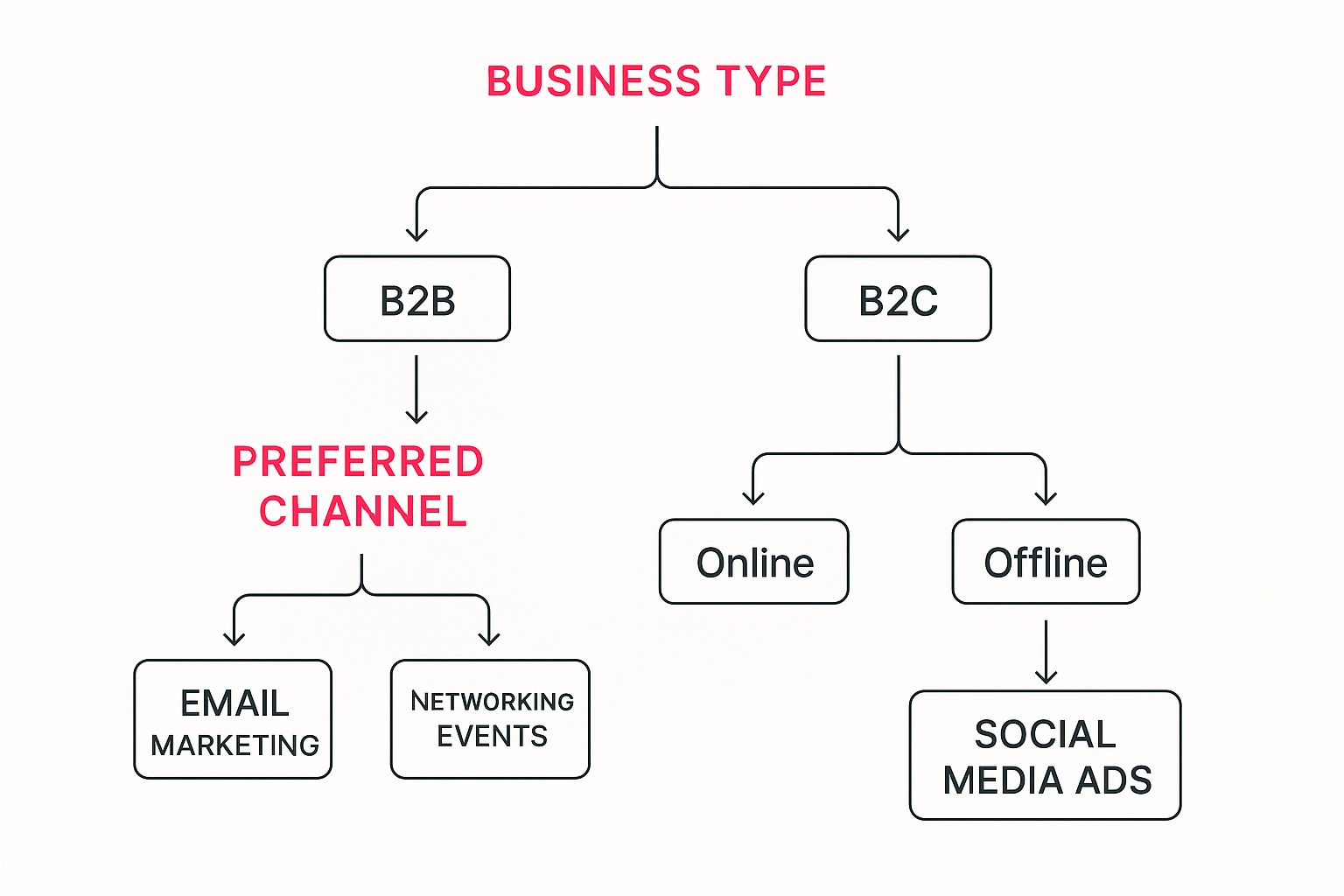Choosing the right lead generation company in Dubai isn't just about outsourcing a task. It’s about finding a strategic partner who truly gets the local market. A cookie-cutter approach that works in other parts of the world will almost certainly fall flat here. To really connect with your audience, you need a team with genuine, on-the-ground expertise.
Finding a Partner in Dubai's Unique Market

Let's be real: generating leads in Dubai is its own beast. You're dealing with a lightning-fast business environment, an incredibly diverse consumer base, and cultural norms that can make or break a deal. This is exactly where a local partner gives you an indispensable edge.
They know the difference between just translating your marketing materials and actually adapting your message. It's about understanding the subtle cultural cues that build trust with B2B decision-makers and resonate with B2C shoppers across the UAE.
Navigating Local Consumer Behaviour
One of the biggest hurdles is Dubai’s multicultural audience. A campaign that works for Emiratis will need a completely different tone, set of channels, and overall strategy than one targeting the huge expatriate community. A local agency lives and breathes this reality. They ensure your message isn’t just seen, but that it actually lands with the right people in the right way.
Getting this right is the foundation of any effective https://grassrootscreativeagency.com/dubai-lead-generation/.
For example, in B2B circles, building a personal relationship is often a non-negotiable first step, long before any talk of a sale. An agency unfamiliar with the region might push for a hard sell too soon, killing the opportunity before it even has a chance.
Choosing the right lead generation company in Dubai is a strategic investment in sustainable growth. It's about finding a team that can act as an extension of your own, navigating the local landscape with precision and expertise.
The Growing Demand for Specialised Services
As the market has matured, so has the need for this kind of specialisation. The lead generation scene in Dubai has grown right alongside the UAE's digital marketing boom. In 2025, the market now boasts over 35 specialised lead generation companies, each focusing on different sectors like real estate, hospitality, tech, and retail.
This surge highlights just how much demand there is for high-quality customer acquisition.
While more choice is a good thing, it also means you have to be more diligent in your search. As you start looking, understanding the wider landscape of specialized lead generation companies can give you some valuable perspective. Your goal is to cut through the noise and find a genuine partner who’s as invested in your long-term growth as you are.
Defining What Success Looks Like for Your Business

Before you even think about picking up the phone or drafting that first email to an agency, the real work has to happen in-house. Hiring a lead generation company in Dubai without a crystal-clear picture of success is like setting sail without a map—you'll drift, burn through your budget, and probably end up miles from where you wanted to be.
Success isn't just a vague feeling of getting "more leads." It's a set of concrete, measurable outcomes. You need to walk into any conversation with a detailed brief that can act as a north star for both your team and your future partner. It ensures everyone is pulling in the same direction from day one.
Crafting Your Dubai-Specific Ideal Customer Profile
The absolute bedrock of any decent lead generation campaign is your Ideal Customer Profile (ICP). I’m not just talking about basic demographics. This is about painting a vivid picture of the exact business or individual you want to reach, specifically within the unique landscape of the UAE market.
A generic ICP just won't cut it here. For example, a B2B tech company needs to go deeper than just company size and industry. They have to consider the nuances of doing business in Dubai.
Think about these local factors for your ICP:
- Decision-Making Culture: Is your target decision-maker someone who values a face-to-face meeting over a dozen emails? That’s common here and can completely change an agency's outreach strategy.
- Business Language: English is the standard, but will you get a better response from certain government bodies or family-run conglomerates with an initial approach in Arabic?
- Geographic Focus: Are you targeting finance firms in DIFC or media companies in Dubai Media City? This level of specificity is what separates a mediocre campaign from a great one.
Getting this profile right stops an agency from wasting your money chasing audiences that look good on paper but are a terrible fit in reality.
Your ICP is more than a targeting parameter; it's a strategic filter. A well-defined profile ensures that the leads you receive aren't just numerous, but are genuinely the right fit for your business, dramatically increasing your chances of conversion.
Setting Realistic and Measurable KPIs
Once you know exactly who you're targeting, you can figure out how you'll measure success. These are your Key Performance Indicators (KPIs), the hard numbers that tell you if your investment is actually working. Showing up to a meeting without these is like going to a performance review with no idea what you were supposed to achieve.
Your KPIs need to be ambitious but firmly grounded in reality. They’ll form the backbone of your service-level agreement (SLA) and keep both sides honest. To get a handle on what's realistic, it's worth getting familiar with proven lead generation best practices.
Here are the essential KPIs you must establish upfront:
- Cost Per Lead (CPL): What's the absolute maximum you can afford to spend to get one qualified lead through the door? This number has to make sense for your bottom line.
- Lead-to-Customer Conversion Rate: What percentage of these leads do you realistically expect your sales team to close? Setting a practical benchmark here is crucial.
- Customer Acquisition Cost (CAC): This is the big one—the total cost to get a single paying customer. Knowing this number inside and out is essential. For a deeper dive, you can explore these 8 essential marketing performance indicators for 2025 to build a solid measurement framework.
Calculating Your Customer Acquisition Cost
Honestly, understanding your CAC is completely non-negotiable. It’s the ultimate reality check for your entire lead generation budget. Put simply, if it costs you AED 1,000 in combined sales and marketing efforts to land a new customer who only brings in AED 800 in profit, your business model is broken.
The basic calculation is straightforward: add up your total sales and marketing spend over a set period, then divide it by the number of new customers you won in that same timeframe. This gives you a powerful baseline.
With this single number, you can walk into a meeting and say, "We need our fully-loaded cost to acquire a customer to be under X amount to stay profitable." This transforms the conversation from a vague request for "more leads" into a strategic, results-focused partnership.
How to Properly Vet Potential Agencies
Right, you’ve got your shortlist. Now the real work begins. It’s easy to be swayed by a slick presentation or a confident sales pitch, but your job is to see past the polish and find out what an agency is truly made of. Choosing the right lead generation company in Dubai comes down to a thorough, almost forensic, vetting process that goes way beyond their marketing fluff.
This means digging deep into their past projects, getting a feel for their actual process, and asking the tough questions that separate a genuine partner from just another vendor.
This decision tree gives you a good idea of how your business type and channel preferences should point you toward the right lead generation strategies.

As you can see, there’s no single "best" way to do this. The right approach is entirely dependent on your business model and who you’re trying to reach.
Scrutinise Their Case Studies with a Critical Eye
Every agency will show you its greatest hits. Your mission is to figure out if their past wins are actually relevant to your business and, crucially, if they can be replicated in the Dubai market. A brilliant campaign for a retail brand in Europe means next to nothing if you're a B2B tech company targeting enterprises in the UAE.
When you’re looking at their case studies, don't just skim. Ask yourself:
- Is the industry relevant? Have they worked in your sector or something very similar? An agency with deep experience in Dubai's real estate market understands its unique challenges far better than a generalist ever could.
- Do they get the local context? Was that amazing campaign run in the UAE or a similar GCC market? Getting results in another region doesn't mean they can automatically do it here.
- Was the client a similar size? Did they deliver for a scrappy startup on a shoestring budget or a multinational with a massive war chest? Make sure their experience matches your company's scale.
- Are the metrics clear? Look for hard numbers. Specifics like a 35% reduction in Cost Per Lead (CPL) or a 50% increase in sales-qualified leads are what you want to see, not vague claims about "boosting engagement."
If their case studies feel generic or the data is fuzzy, consider it a major red flag. A truly confident agency will have no problem sharing the details of their successful partnerships.
Get to Know Their Team and Tech Stack
The people running the show and the tools they use are just as critical as the strategy itself. You need to know exactly who will be managing your account and what technology they're bringing to the table. This is where you really start to gauge their operational competence.
A great agency is a blend of smart people and smart technology. You need to be confident in both, ensuring they have the expertise to build the strategy and the tools to execute it efficiently at scale.
Don't be shy about probing their internal setup. For example, ask them about their experience integrating with different CRMs like HubSpot or Salesforce. A smooth integration is non-negotiable for tracking a lead from their first click all the way to a closed deal. Any friction here can cause huge data headaches and reporting gaps later on.
Find out if their specialists for SEO, paid media, and content are in-house or if they outsource that work. In-house teams usually mean better communication and a more unified strategy. When vetting, it’s always useful to see how they stack up against the top digital marketing agency benchmarks for team structure and overall capability.
Before you get too deep into conversations, it helps to have a checklist of questions ready. This ensures you're evaluating every agency on the same criteria, making your final decision much clearer.
Key Questions for Vetting Agencies
| Area of Inquiry | Key Question to Ask | What to Look For in the Answer |
|---|---|---|
| Experience & Results | "Can you walk me through a campaign for a client similar to us, ideally in the UAE?" | Specifics. Look for clear metrics (CPL, MQLs), challenges they faced, and how they solved them. Vague answers are a warning sign. |
| Team Structure | "Who, specifically, will be working on our account and what is their experience?" | Direct access to strategists and specialists. You don't want to be passed off to a junior account manager with no real authority. |
| Process & Reporting | "What does your reporting look like, and how often will we meet to discuss progress?" | A focus on business outcomes (leads, sales), not just vanity metrics (clicks, impressions). They should offer a transparent, regular reporting cadence. |
| Technology & Tools | "What's in your tech stack, and how do you handle CRM integration?" | Familiarity with industry-standard tools and a clear, proven process for integrating with your existing systems without causing disruption. |
Having these answers helps you compare apples to apples, moving beyond the sales pitch to see the real operational substance of each agency.
Watch Out for These Common Red Flags
As you talk with different agencies, keep your antennae up for warning signs. Some are masters of overpromising and under-delivering. Spotting these tells can save you from a very expensive mistake.
Here are the biggest red flags to be aware of:
- "Guaranteed Results." This is the number one sign of trouble. No credible agency can guarantee a specific number of leads or a set ROI. Marketing has too many variables, and anyone making that kind of promise is being dishonest to get your signature.
- A Lack of Transparency. If they get cagey about their process, their pricing structure, or who will actually be working on your account, walk away. A real partner is an open book from day one.
- The "Secret Sauce" Mentality. Be very sceptical of agencies claiming they have a proprietary, top-secret method they can't explain. Great lead generation is built on proven strategies, solid data analysis, and consistent hard work—not magic. They should be able to articulate their approach clearly and logically.
Decoding Proposals and Pricing Models
https://www.youtube.com/embed/IuV80wYRld0
When the proposals start rolling in, it's tempting to jump straight to the last page and compare the numbers. But I’ve seen it time and again: fixating only on the price is the fastest way to choose the wrong partner. A cheap proposal often just means a smaller scope, rushed work, or that the agency didn't truly grasp what you're trying to achieve.
Your goal isn't to find the cheapest service; it's to secure the best value. That means you need to look past the top-line number and really dissect what’s being offered—the strategy, the deliverables, and how they’ve structured their fees. This is where you separate the serious contenders from the rest.
Beyond the Price Tag: What a Great Proposal Looks Like
A solid proposal is much more than a quote; it's a blueprint for your success. It should be obvious that the agency has listened carefully, done their homework on your business, and put together a plan just for you.
As you read through each one, keep an eye out for these crucial elements:
- They Get Your Goals: Does the proposal talk about your specific KPIs, your target audience, and your business objectives? A generic, copy-and-paste job is a massive red flag.
- A Detailed Scope of Work (SOW): The SOW should be crystal clear, spelling out every single activity. From keyword research and content creation to ad management and monthly reporting, leave no room for ambiguity. Vagueness here always causes headaches down the line.
- Clear Deliverables and Timelines: What exactly will you get, and when? I always look for a detailed roadmap for the first 90 days that outlines key milestones and what progress should look like.
If a proposal is light on these details, it probably means the agency's process is, too. A great partner invests the time to build a thoughtful plan before they ask you to sign on the dotted line.
Common Pricing Models You’ll See in Dubai
How an agency structures its pricing says a lot about its philosophy. In Dubai, you'll typically run into a few common models, and each comes with its own trade-offs. Getting to grips with them is key to finding a setup that matches your budget and how much risk you're willing to take on.
First, a crucial piece of advice: agree on a precise definition of a "qualified lead" and get it in writing.
A Sales Qualified Lead (SQL) isn't just a random contact. It's a prospect who fits your Ideal Customer Profile (ICP), has shown genuine buying intent, and is primed for a real conversation with your sales team. Without this shared understanding, you'll find yourself paying for a list of names instead of actual opportunities.
Let’s break down the typical models you'll encounter from a lead generation company in Dubai.
Comparing Agency Pricing Structures
| Pricing Model | How It Works | Best For | Potential Downside |
|---|---|---|---|
| Monthly Retainer | You pay a fixed fee each month for an agreed-upon scope of services. | Businesses seeking a long-term, integrated strategic partnership. | Can feel expensive upfront; results aren't directly tied to cost. Requires high trust. |
| Pay-Per-Lead (PPL) | You pay a set price for each qualified lead the agency delivers. | Companies with a tight budget who want to minimise financial risk. | Can incentivise quantity over quality if the 'lead' definition isn't strict. |
| Performance-Based | The agency's fee is a percentage of the revenue generated from their leads. | High-ticket B2B services where deal value is significant and easy to track. | Can be complex to set up and requires transparent sharing of sales data. |
| Hybrid Model | A combination of a smaller monthly retainer plus a performance bonus or PPL fee. | Businesses that want a balance of strategic support and performance-based accountability. | Can sometimes be more complex to manage and track than a single-model structure. |
Any of these models can be effective, but only if it clicks with your company's finances and growth plans. The hybrid model is often a fantastic middle ground—it ensures the agency gets paid for their strategic efforts while keeping them motivated by the results they generate.
In Dubai's bustling market, agencies have adapted with diverse models. For instance, some firms offer a pay-per-lead (PPL) structure where you only pay a fixed price for each genuinely qualified lead. This approach is great for managing risk and making your costs predictable—a huge advantage in such a competitive environment. You can find more insights about UAE lead generation companies and their models.
Ultimately, the winning proposal won't be the cheapest. It will be the one that lays out a clear, logical, and data-backed plan to hit your specific goals, supported by a pricing model that feels like a true partnership. That’s how you stop comparing costs and start evaluating true return on investment.
Setting Your New Agency Up for Success

So, you’ve signed the contract. It’s a great feeling, but this is the starting block, not the finish line. I’ve seen it time and again: the first 30 days with your new lead generation company in Dubai will make or break the relationship. A rushed or chaotic start almost always spirals into missed expectations and a frustratingly slow ramp-up.
But get it right, and you'll see a completely different outcome.
A structured, collaborative onboarding process is how you turn a signed agreement into a high-performing lead generation engine. The aim is to get from handover to real momentum as smoothly as possible, avoiding all those classic early-stage bumps in the road. This isn't just about emailing over a few files; it’s about strategically weaving two teams into one.
The Kick-Off Meeting Is Non-Negotiable
Your very first action item has to be a formal kick-off meeting. And no, a quick "hello" call won't cut it. This needs to be a proper strategic session that establishes the rules of engagement for everyone.
Think of this meeting as your chance to get beyond the proposal's promises and into the nitty-gritty of how you'll work together day-to-day. It’s where you hammer home your KPIs, double-check that your definition of a "qualified lead" matches theirs, and set realistic expectations for the first month. When everyone leaves that meeting, they should know exactly what’s needed from them and what the very next steps are.
Make sure your agenda covers these essentials:
- Team Introductions: Who is their day-to-day contact? Who’s the lead strategist? Putting faces to names right away is crucial.
- KPI and Goal Review: A final, verbal confirmation of the primary objectives. You want to hear them repeat the numbers back to you, so you know everyone is aligned.
- Process Walkthrough: How, specifically, will leads be passed over? What does the approval process look like for a new ad creative? Map it out.
- Timeline Confirmation: Run through the 30, 60, and 90-day roadmap one more time to make sure key milestones are crystal clear.
Establish Clear Communication Channels from Day One
Fuzzy communication is the number one killer of agency-client relationships. Before any work begins, decide how and when you’ll talk. Letting everything live in scattered email threads is a recipe for disaster—important details get buried, and accountability vanishes.
A shared Slack or Microsoft Teams channel works brilliantly for quick questions and informal updates. It keeps the daily chatter in one place where everyone can see it. For the bigger picture, lock in a recurring weekly or bi-weekly progress call to discuss strategy and results.
Define your points of contact immediately. Having a single, designated person on both sides responsible for relaying information prevents mixed messages and creates clear lines of accountability. It ensures nothing falls through the cracks.
This two-tiered system is perfect. Urgent things get handled instantly in chat, while strategic conversations get the dedicated time they deserve in scheduled meetings.
The Great Asset Handover
Your new agency can't work without the right tools and information. A messy handover of brand assets, customer insights, and account access can easily delay your campaigns by weeks. Get ahead of this by preparing a comprehensive package before the kick-off meeting.
Create a shared folder in Google Drive or a similar platform and organise everything logically. This simple act of preparation not only shows you’re a professional partner but also empowers the agency to start working immediately, instead of spending their first week chasing you for logos and logins.
Here’s a checklist for your asset package:
- Brand Guidelines: All your logo files, colour codes, fonts, and your tone of voice guide.
- Existing Customer Data: Anonymised data about your best customers is gold dust for building lookalike audiences.
- Previous Campaign Results: Give them access to past ad accounts or analytics. They need to see what worked and, just as importantly, what didn't.
- Content Library: A collection of your best images, videos, case studies, and testimonials they can put to use straight away.
By treating the onboarding process with this level of care, you build a solid foundation for a successful, long-term partnership—one that’s built on clarity, efficiency, and mutual respect from the get-go.
Got Questions About Lead Generation in Dubai? We've Got Answers
Stepping into a partnership with a lead generation company in Dubai always brings up a lot of questions. That’s perfectly normal. Getting straight answers is crucial before you put your budget and trust on the line.
Let's cut through the noise and tackle the most common things businesses want to know. This isn't just about finding a supplier; it's about finding a genuine partner who gets your financial reality and is aligned with your growth ambitions from the get-go.
What’s a Realistic Budget for Lead Generation Here?
This is always the first question, and the honest-to-goodness answer is: it really depends. There's no magic number. Your budget hinges on how competitive your industry is, who you're trying to reach, and how aggressive you want to be. Dubai's market is too diverse for a one-size-fits-all price tag.
For a smaller business or a startup just dipping its toes in the water, a solid starting point could be around AED 10,000 to AED 15,000 per month. This usually covers the agency's management fee and leaves a modest amount for ad spend.
But if you're playing in a tough sandbox like real estate or high-end B2B services, you need to be prepared to invest more seriously. In these competitive fields, budgets can easily climb from AED 30,000 to well over AED 100,000 monthly.
The biggest mindset shift is to stop looking at it as a cost and start seeing it as an investment. A good agency will build a business case with you, projecting lead volume and quality so you can clearly see how that investment turns into actual revenue.
How Long Until We Start Seeing Real Results?
I know you want leads tomorrow, but patience is your best friend here. While some quick-win tactics like a tightly targeted Pay-Per-Click (PPC) campaign can get the phone ringing in a few weeks, building a truly reliable lead generation engine takes time. It’s all about testing, learning, and refining.
You should mentally and financially prepare for a 90-day ramp-up period.
Here’s a typical timeline:
- Month One: This is all about foundation work. We're talking deep-dive research, building out your target audiences, and launching the initial campaigns. Think of it as laying all the essential pipework.
- Month Two: Now the data starts rolling in. The agency will be busy figuring out what’s hitting the mark and what isn't, then starting to optimise—tweaking ad copy, adjusting targeting, and improving landing pages.
- Month Three: By this point, the campaigns should be finding their rhythm. You can expect a much more consistent and predictable flow of quality leads coming into your pipeline.
Heads up, though: longer-term strategies like SEO and content marketing are a different beast entirely. These are incredibly powerful, but they often take 6 to 12 months to really show their compounding value.
What's the Difference Between a Lead Gen Company and a Digital Marketing Agency?
This is a super common point of confusion, but the distinction is critical. It all boils down to one word: focus.
A general digital marketing agency offers a bit of everything. Their main goal is often to increase your overall brand presence with activities like social media management, branding exercises, and broad awareness campaigns. They measure success with metrics like engagement, reach, and website traffic.
A specialised lead generation company in Dubai, on the other hand, has a single, laser-focused mission: to fill your sales pipeline with qualified prospects who are ready to talk business. Their success is tied directly to the metrics that matter to your bottom line.
They live and breathe numbers like:
- Cost Per Lead (CPL)
- Marketing Qualified Leads (MQLs)
- Sales Qualified Leads (SQLs)
- Lead-to-Customer Conversion Rate
That sharp focus means they are accountable for delivering tangible, revenue-driving results—not just vanity metrics that look nice in a report.
Should We Only Hire an Agency That Specialises in Our Industry?
Hiring an agency that already has experience in your industry can feel like a massive shortcut, and often it is. They already speak your language, they get your customers' pain points, and they know which channels and messages work. That prior knowledge can dramatically shorten the learning curve and get you results faster.
An industry specialist shows up on day one with relevant case studies and benchmark data.
However, it's not a deal-breaker. A top-tier agency with a rock-solid, data-driven process can be just as effective, even if they're new to your niche. If they can demonstrate a clear, thorough methodology for getting under the skin of your business, market, and customers, they can often bring a fresh perspective that an industry insider might miss. The key is their process for gaining that knowledge.
At Grassroots Creative Agency, we blend data-supported strategies with creative execution to build lead generation engines that deliver measurable growth. Discover how our bespoke approach can fill your sales pipeline.








